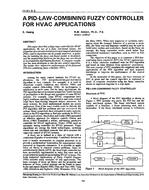Thirty New York City multifamily-buildings combined steam heating and domestic hot water (DHW) plants were instrumented for monitoring (mostly hourly) apartment, outdoor, boiler, and DHW temperatures and burner on-off times. In nine of these buildings, which had been upgraded, additional data collected were stack temperature, DHW flow in 15-minute increments, oil and boiler make-up water flows, and DHW temperature before and after the mixing valve and on the return line. The data set collected for 14 months amounts to a database of more than 110 megabytes. The project’s objectives were to develop comprehensive operating data on combined DHW and heating systems to be used in system design and specifications. DHW requirements in multifamily buildings are currently calculated on the basis of questionable standards. These new, more precise DHW flow data (broken down per capita) result in a better basis for sizing than existed before. Presents DHW demand patterns, seasonal variations, weekday versus weekend consumption, consumption versus occupancy levels, coincidence of 15-, 60-. 120-. and 180-minute demand periods, and average versus peak demand levels.
KEYWORDS: domestic, hot water supply, flats, combination boilers, steam, water heaters, monitoring, temperature, boilers, operations, heating, water consumption, sizing, accuracy.
Citation: Symposium, ASHRAE Trans. 1994, Vol.100, Part 1,
Product Details
- Published:
- 1994
- File Size:
- 1 file , 1.8 MB
- Product Code(s):
- D-17865


